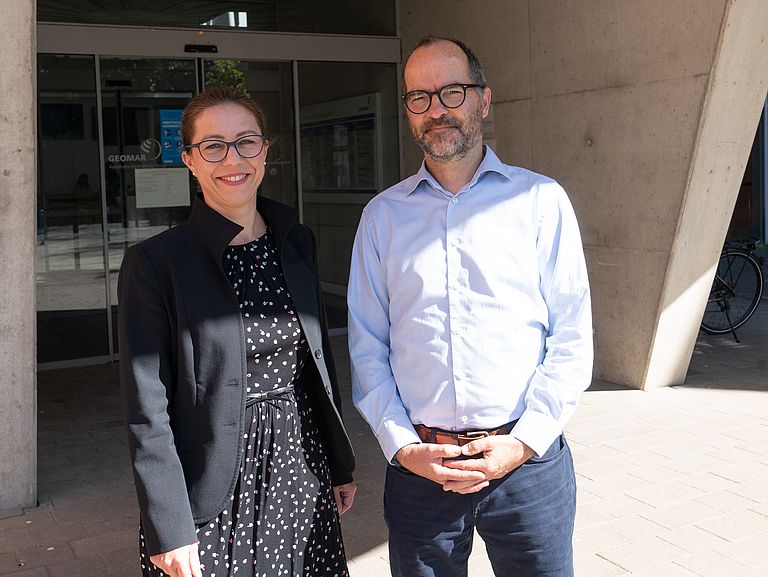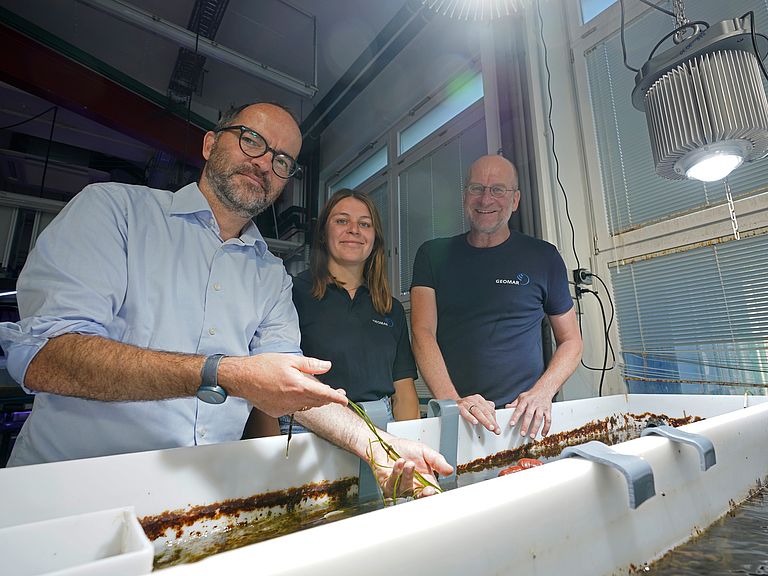Joining forces for our ocean
Federal Government Commissioner for the Ocean Sebastian Unger and GEOMAR researchers discuss important issues of protection and sustainable use of the ocean
Ocean observation and a look at the Baltic Sea as a time machine, deep-sea mining and the protection of the high seas, ocean health, options for carbon uptake in the ocean and seagrass restoration, interdisciplinary as well as international cooperation and better integration of the Global South in marine research – during his full-day visit at GEOMAR Helmholtz Centre for Ocean Research Kiel, the German Federal Government Commissioner for the Ocean Sebastian Unger and GEOMAR researchers exchanged views on a wide range of topics. The internationally recognised expert on ocean governance and marine protection based at the Federal Ministry for the Environment, Nature Conservation, Nuclear Safety and Consumer Protection (Bundesministerium für Umwelt, Naturschutz, nukleare Sicherheit und Verbraucherschutz, BMUV) built on many long-standing contacts from his scientific career and took away new impulses for his work.
“The mutual exchange at a high level is extremely valuable for our further research at GEOMAR and strengthens us in our mission to contribute sound knowledge to political processes and societal decisions,” emphasises GEOMAR Director Professor Dr. Katja Matthes. “We very much welcome the opportunity to set the course for increased cooperation with the ocean commissioner and other political actors beyond ministerial resorts in order to work together on solutions to the pressing challenges in the field of marine conservation.”
A particular focus of the talks was placed on the Future of Tropical Upwelling Regions in the Atlantic Ocean (FUTURO) project. This GEOMAR initiative aims to investigate how the socially and economically important upwelling region off West Africa will develop in the course of climate change and how this biologically particularly productive and biodiverse region can be protected and used sustainably. The project will work intensively collaborate with actors in the region and develop research questions in close cooperation with various stakeholder groups. It is an outstanding example of how oceans can be researched and protected together – and illustrates the essential importance of close cooperation between policy and science.
“The ocean is our ally in the fight against the climate crisis and species extinction. We must protect it and understand it better. Marine research here in Kiel and in Germany is doing excellent work for this and provides the knowledge we need,” Unger said about his visit to Kiel.

GEOMAR Director Professor Dr. Katja Matthes welcomed Sebastian Unger, German Federal Government Commissioner for the Ocean, at GEOMAR. Photo: Maike Nicolai, GEOMAR

During his visit, the German Commissioner for the Ocean, Sebastian Unger (left) also learned more about GEOMAR's research on seagrass restoration from Jana Willim and Professor Dr. Thorsten Reusch. Photo: Maike Nicolai, GEOMAR


